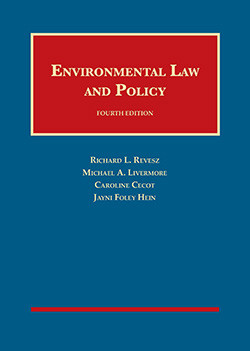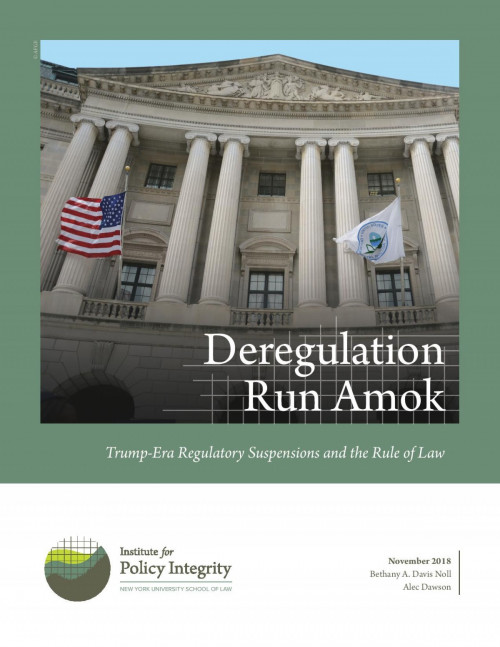-

Environmental Law and Policy, 4th Ed.
This casebook emphasizes environmental policy, as well as the structure and details of the federal environmental statutes. It focuses students’ attention on how tradeoffs between environmental goals and social goals are resolved in different and difficult contexts. The book has been updated to reflect new developments in the law of natural resource management, water pollution, and climate change.
-
Comments to EPA on Reconsideration of Mercury and Air Toxics Standards
The Environmental Protection Agency (EPA) is proposing to withdraw a prior finding that it is “appropriate and necessary” to regulate power-sector emissions of mercury and other “air toxics” under the Clean Air Act. We submitted comments arguing that EPA has failed to provide a reasoned explanation for this change of course.
-
Comments on the Replacement of the Clean Water Rule
The Environmental Protection Agency (EPA) and Army Corps of Engineers are proposing to replace the 2015 Clean Water Rule with a new rule that would harm many waterways by removing critical federal protections. We submitted comments detailing how the agencies provide flawed analysis in support of the proposal. Dr. Peter Howard and Dr. Jeffrey Shrader also submitted an expert report detailing the flaws in the agencies’ new valuation of wetland benefits.
-
Amicus Brief on the Good Neighbor Provision of the Clean Air Act
The Clean Air Act includes a Good Neighbor Provision, which requires states to prohibit their own sources of pollution from emitting in quantities that “contribute significantly” to another state’s inability to achieve national ambient air quality standards. When upwind states fail to abide by this requirement, the Act authorizes downwind states to petition the Environmental Protection Agency (EPA) for relief.
In 2018, EPA denied five such petitions filed by Maryland and Delaware, which sought tighter limits on ozone-forming emissions from power plants in Indiana, Kentucky, Ohio, Pennsylvania, and West Virginia. Maryland and Delaware, supported by other states and a coalition of environmental groups, have now challenged those denials in the U.S. Court of Appeals for the D.C. Circuit. In our amicus brief supporting the challenges, we focused on EPA’s erroneous claim that no further emission reductions at the specified plants would be cost-effective.
-
Comments to the FCC on Regulation of Space Debris
The Federal Communications Commission (FCC) is seeking comments on economic approaches that might be feasible and effective in reducing the negative impacts of orbital debris in space. We submitted comments offering initial suggestions for what the Commission might consider in choosing a market-based regulation. We also recommend that any impact assessment of the regulation takes into account the full range of direct and indirect benefits.
-
Comments to EPA on Delay of Landfill Emission Guidelines
In 2016, EPA finalized Emission Guidelines and Compliance Times for Municipal Solid Waste Landfills. Once implemented, the regulation will deliver significant net benefits from reducing pollution that contributes to climate change and other harmful impacts to human health. EPA, however, is proposing to substantially delay the implementation of these protections. We submitted comments that point out how EPA fails to justify the proposed delay and assess its social costs.
-
Comments on EPA Rollback of Refrigerant Substitutes Regulation
EPA recently proposed rolling back regulatory provisions that curb emissions of refrigerant substitutes, which are highly potent greenhouse gases. The agency admits that the rescissions would significantly increase the release of refrigerator hydrofluorocarbons (HFCs) but fails to monetize the climate damages caused by forgone emissions reductions. We submitted comments explaining how EPA should value the climate damages of these greenhouse gases.
-

Deregulation Run Amok
Trump-Era Regulatory Suspensions and the Rule of Law
Our report provides a survey of the legality of Trump Administration’s regulatory suspensions. Looking at a number of cases, we discuss the administration’s disregard for notice-and-comment requirements, statutory restrictions, and the reasoned explanation requirement. We also lay out some of the challenges facing advocates, and the strategies by which agencies have evaded review.
-
Comments on California’s Proposed State-Specific Vehicle Emissions Regulations
We recently submitted comments to the California Air Resource Board (CARB) on its proposal to maintain existing statewide vehicle emission regulations. In coming years, the National Highway Traffic Safety Administration and Environmental Protection Agency plan to weaken federal environmental regulations. CARB is aiming to hold California vehicle emissions at current standards to avoid the effects of weakened regulations. Our comments support the feasibility of California’s current standards and encourage CARB to improve its economic impact assessment by accounting for new federal proposals and a broader range of effects.
-
Brief on the Clean Water Rule’s “Applicability Date”
The Environmental Protection Agency and Army Corp of Engineers were sued for suspending implementation of the Clean Water Rule through the addition of an “applicability date” to the Clean Water Rule. Our brief to the U.S. District Court for the Southern District of New York in that case argues that the court should vacate the Suspension Rule because the agencies improperly ignored the forgone benefits of suspending the Clean Water Rule.
Viewing recent projects in Environmental Health





